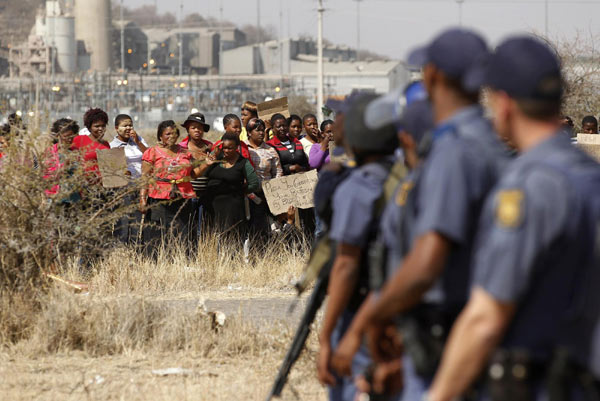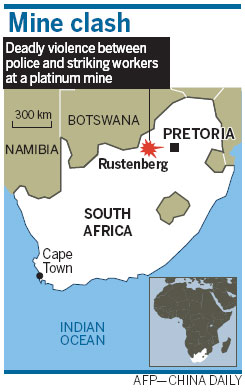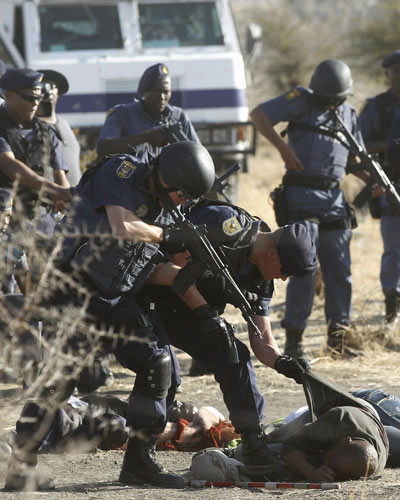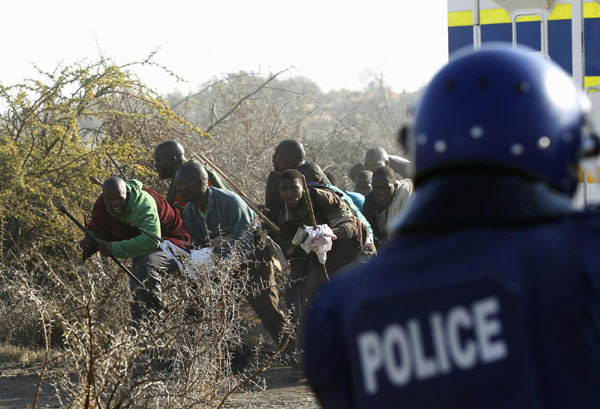36 workers killed in South African mine clash
Updated: 2012-08-18 10:58
(China Daily)
|
|||||||||||
Union chief says 36 workers killed in confrontation
The death toll of Thursday's shootout between the police and miners in northern South Africa has climbed to 36, a union chief said on Friday morning.
"Our shop-stewards on the ground report that 36 people were killed," the general-secretary of the National Union of Mineworkers Frans Baleni said.
 |
|
Police look on as women carry placards in protest against the killing of miners by the South African police on Thursday, outside a South African mine in Rustenburg, 100 km (62 miles) northwest of Johannesburg, Aug 17, 2012. [Photo/Agencies] |
A force of mostly black officers in bulletproof vests, some on horseback, fired at a crowd of black workers armed with spears, clubs and machetes, with some gunfire heard from the workers' camp as well.
Police said the workers were advancing on them with guns and machetes.
 |
Phiyega said at a news conference on Friday that her officers acted to protect their own lives after strikers armed with "dangerous weapons" charged them on Thursday. She said the strikers had not dispersed earlier, despite police use of water cannon and stun grenades.
President Jacob Zuma is coming home from a regional summit in neighboring Mozambique to address the crisis that is seen as deepening the rift between his scandal-plagued ruling party and an increasingly angry electorate confronting massive unemployment, poverty and inequality.
"The police were directing (unrolling) the barbed wire ... when people had guns, and people were advancing as I say, with their pangas (machetes) and everything else including firearms," Police Minister Nathi Mthethwa said.
"This was not supposed to happen, and we have always emphasized this thing that we have laws in this country which allows people to apply for strike, for marching, for demonstration, and we still think people should not ignore the pillars of the land," he said.
Baleni of the NUM blamed the unrest on the radical Association of Mineworkers and Construction Union, which has been trying to grow its membership.
"They made them promises which can never be delivered, and in the process organized an illegal action which was violent and which led to a loss of lives," he told local radio.
 |
|
Policemen inspect one of the dead miner after they were shot outside a South African mine in Rustenburg, 100 km (62 miles) northwest of Johannesburg, Aug 16, 2012. [Photo/Agencies] |
The wildcat strike started on Aug 10 as about 3,000 workers demanded that London-listed Lonmin triple their wages from the current monthly salary of about 4,000 rand ($482).
Ten people, including two police, were killed as the strike degenerated into clashes between the unions - with several victims violently hacked to death.
But Thursday's violence shocking even to a nation accustomed to frequent strikes and gruesome crime. Local media already dubbed the incident the "Marikana massacre", evoking memories of the 1960 Sharpeville massacre when 69 people were killed as apartheid police gunned down blacks protesting minority rule.
The South African Institute of Race Relations said the strike is the deadliest since a three-month stayaway by security guards in 2006, when 60 non-strikers were killed, mainly thrown from moving trains.
But South Africa hasn't seen such deadly police action since 1985, when more than 20 people were shot dead by apartheid police who put down a protest by blacks outside Cape Town - on the 25th anniversary of the Sharpeville massacre, the Institute said.
After that killing, police reformed their crowd control measures, skills that now appear to have been lost, said the Institute's Research Manager Lucy Holborn.
"In a crowd control situation, police shouldn't be armed with live ammunition," she said.
"It comes down to inadequate training, to too few police dealing with too many people, without adequate protection like shields."
 |
|
A policeman (R) fires at protesting miners outside a South African mine in Rustenburg, 100 km (62 miles) northwest of Johannesburg, Aug 16, 2012. [Photo/Agencies] |
Local media denounced the "killing field" at Marikana in banner headlines.
Low platinum prices have already forced companies to close several mines since June, fueling fears among workers over their job security, said labor analyst Daniel Silke.
The violence also points "to a heated political atmosphere in South Africa that is playing itself out on the ground within the unions," Silke said.
NUM is one of South Africa's most powerful unions, having produced several top leaders in the ruling African National Congress, including the party's Secretary-General Gwede Mantashe and Deputy President Kgalema Motlanthe.
Leaders in both the ANC and the broader labor movement are battling for their political futures this year as the ruling party heads to its elective conference in December, where Zuma is seeking a second term.
Agencies in Marikana, South Africa
Xinhua-AFP-AP
Related Stories
Promote security in Africa with cooperation 2012-08-17 20:41
36 died in South Africa's mine shootout 2012-08-17 17:17
Crackdown on mine strike in S. Africa kills 30 2012-08-17 14:52
Today's Top News
President Xi confident in recovery from quake
H7N9 update: 104 cases, 21 deaths
Telecom workers restore links
Coal mine blast kills 18 in Jilin
Intl scholarship puts China on the map
More bird flu patients discharged
Gold loses sheen, but still a safe bet
US 'turns blind eye to human rights'
Hot Topics
Lunar probe , China growth forecasts, Emission rules get tougher, China seen through 'colored lens', International board,
Editor's Picks

|

|

|

|

|

|





